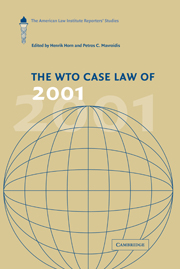Book contents
- Frontmatter
- Contents
- Foreword
- A note on the American Law Institute
- List of reporters
- 1 Introduction
- 2 EC – Asbestos European Communities – Measures Affecting Asbestos and Asbestos-Containing Products
- 3 US – Shrimp United States – Import Prohibition of Certain Shrimp and Shrimp Products, Recourse to Article 21.5 of the DSU by Malaysia
- 4 US – Lamb United States – Safeguard Measures on Imports of Fresh, Chilled or Frozen Lamb Meat from New Zealand and Australia: What Should Be Required of a Safeguard Investigation?
- 5 EC – Bed Linen European Communities – Anti-Dumping Duties on Imports of Cotton-Type Bed Linen from India
- 6 Mexico – Corn Syrup Mexico – Anti-Dumping Investigation of High Fructose Corn Syrup from the United States, Recourse to Article 21.5 of the DSU by the United States
- 7 Argentina – Ceramic Tiles Argentina – Definitive Anti-Dumping Measures on Imports of Ceramic Floor Tiles from Italy
- 8 US – Lead and Bismuth II United States – Imposition of Countervailing Duties on Certain Hot-Rolled Lead and Bismuth Carbon Steel Products Originating in the United Kingdom: Here Today, Gone Tomorrow? Privatization and the Injury Caused by Non-Recurring Subsidies
- 9 US – Export Restraints United States – Measures Treating Export Restraints as Subsidies
- 10 Canada - Dairy Canada – Measures Affecting the Importation of Dairy Products and the Exportation of Milk
- 11 US – Section 110(5) Copyright Act USt – Section 110(5) of the US Copyright Act, Recourse to Arbitration under Article 25 of the DSU: Would've or Should've? Impaired Benefits due to Copyright Infringement
- Index
2 - EC – Asbestos European Communities – Measures Affecting Asbestos and Asbestos-Containing Products
Published online by Cambridge University Press: 06 July 2010
- Frontmatter
- Contents
- Foreword
- A note on the American Law Institute
- List of reporters
- 1 Introduction
- 2 EC – Asbestos European Communities – Measures Affecting Asbestos and Asbestos-Containing Products
- 3 US – Shrimp United States – Import Prohibition of Certain Shrimp and Shrimp Products, Recourse to Article 21.5 of the DSU by Malaysia
- 4 US – Lamb United States – Safeguard Measures on Imports of Fresh, Chilled or Frozen Lamb Meat from New Zealand and Australia: What Should Be Required of a Safeguard Investigation?
- 5 EC – Bed Linen European Communities – Anti-Dumping Duties on Imports of Cotton-Type Bed Linen from India
- 6 Mexico – Corn Syrup Mexico – Anti-Dumping Investigation of High Fructose Corn Syrup from the United States, Recourse to Article 21.5 of the DSU by the United States
- 7 Argentina – Ceramic Tiles Argentina – Definitive Anti-Dumping Measures on Imports of Ceramic Floor Tiles from Italy
- 8 US – Lead and Bismuth II United States – Imposition of Countervailing Duties on Certain Hot-Rolled Lead and Bismuth Carbon Steel Products Originating in the United Kingdom: Here Today, Gone Tomorrow? Privatization and the Injury Caused by Non-Recurring Subsidies
- 9 US – Export Restraints United States – Measures Treating Export Restraints as Subsidies
- 10 Canada - Dairy Canada – Measures Affecting the Importation of Dairy Products and the Exportation of Milk
- 11 US – Section 110(5) Copyright Act USt – Section 110(5) of the US Copyright Act, Recourse to Arbitration under Article 25 of the DSU: Would've or Should've? Impaired Benefits due to Copyright Infringement
- Index
Summary
EC – Asbestos as Watershed
Some cases attain “landmark” status because they constitute a jurisprudential paradigm shift. Others attain such status because in them a decisor, usually a supreme jurisdiction, renders a definitive, “canonical,” ruling. Sometimes it is both reasons. Sometimes, rarely, it is neither. EC – Asbestos is such a rare case. It may well qualify as a landmark. It has, justifiably, attracted huge attention and, understandably, considerable controversy. Its reasoning, however, is so decidedly non-definitive that it is not, consequently, possible to say whether it represents a veritable paradigm shift or is just a badly reasoned case by the Appellate Body (AB), albeit with a non controversial result.
It is a rare, indeed unique, instance that embedded in the decision itself a Member of the Appellate Body Division which decided the case expresses “substantial doubt” as to the core reasoning of the decision. And although the AB rejected the reasoning, not the final outcome, of the Panel's decision, the doctrinal implications of the rejection are not clear and continue to be contested.
The importance of Asbestos must initially be found in its factual matrix, a French Government Decree of 1966 providing, inter alia, in its first article as follows:
I. – For the purpose of protecting workers, … the manufacture, processing, sale, import, placing on the domestic market and transfer under any title whatsoever of all varieties of asbestos fibres shall be prohibited, regardless of whether these substances have been incorporated into materials, products or devices.
II. – For the purpose of protecting consumers, … the manufacture, import, domestic marketing, exportation, possession for sale, offer, sale and transfer under any title whatsoever of all varieties of asbestos fibres or product containing asbestos fibres shall be prohibited …
- Type
- Chapter
- Information
- The WTO Case Law of 2001The American Law Institute Reporters' Studies, pp. 14 - 40Publisher: Cambridge University PressPrint publication year: 2004
- 1
- Cited by



